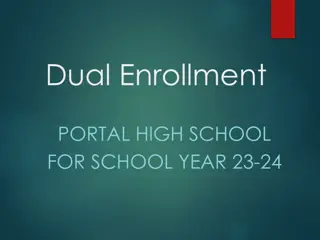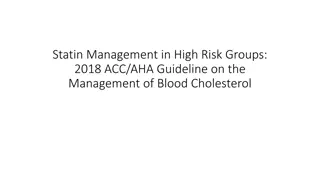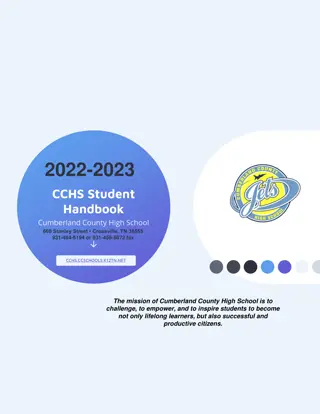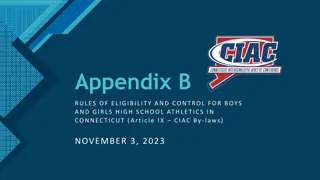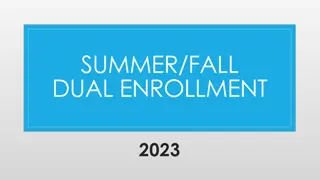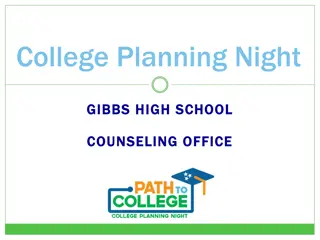
How to Effectively Use Study Groups for Better Grades in High School and College
In this article, weu2019ll unlock the secrets to forming and utilizing study groups effectively, whether youu2019re looking for a high school study group to ace your next exam or a best college study group to conquer challenging coursework. Read full article https://explainlearning.com/blog/how-to-effectively-use-study-groups-for-better-grades-in-high-school-and-college/
Uploaded on | 9 Views
Download Presentation

Please find below an Image/Link to download the presentation.
The content on the website is provided AS IS for your information and personal use only. It may not be sold, licensed, or shared on other websites without obtaining consent from the author. If you encounter any issues during the download, it is possible that the publisher has removed the file from their server.
You are allowed to download the files provided on this website for personal or commercial use, subject to the condition that they are used lawfully. All files are the property of their respective owners.
The content on the website is provided AS IS for your information and personal use only. It may not be sold, licensed, or shared on other websites without obtaining consent from the author.
E N D
Presentation Transcript
How to Effectively Use Study Groups for Better Grades in High School and College Learning doesn t have to be a solitary journey. Study groups can be a powerful tool for both high school and college students, offering a collaborative space to deepen understanding, boost motivation, and ultimately achieve better grades. But let s be honest, not all study groups are created equal. Turning a good intention into a best study group requires planning, structure, and a commitment to active learning. In this article, we ll unlock the secrets to forming and utilizing study groups effectively, whether you re looking for a high school study group to ace your next exam or a best college study group to conquer challenging coursework. Building the Best Study Group: 1. Find the Right Fit: Compatibility is key: Seek out individuals with similar learning styles, work ethics, and commitment levels. Don t just invite your besties if they re prone to distractions! Subject-specific or mixed?: Decide if you want a group focused on one subject or covering multiple related courses. The former allows for deep dives, while the latter offers broader support.
Size matters: Aim for 3-5 members. Larger groups can get unwieldy, while smaller ones lack diversity in perspectives. 2. Structure is Your Friend: Set clear goals: What do you want to achieve in each session? Review specific chapters, practice problem-solving, or prepare for an upcoming test? Align goals with the chosen materials. Schedule like a boss: Choose regular meeting times and stick to them. Consider using collaborative calendars and online tools to manage schedules effectively. Ground rules are golden: Establish expectations for active participation, focus, and respecting each other s time. Don t hesitate to address distractions or unproductive behaviors promptly. Maximizing Your Study Group: 1. Active Learning Strategies: Go beyond passive note-taking: Encourage discussions, practice explaining concepts to each other, and quizzing one another. This active recall method solidifies understanding better than simply rereading notes. Embrace different learning styles: Visual learners might benefit from diagrams, while kinesthetic learners may prefer role-playing or simulations. Cater to various learning preferences to ensure everyone benefits. Challenge and support each other:Don t shy away from asking tough questions or offering constructive feedback. A healthy learning environment thrives on intellectual exchange and growth. 2. Utilize Technology: Virtual study groups: Online platforms like Zoom or Google Meet are excellent for geographically dispersed groups. Utilize breakout rooms for smaller discussions and collaborative tools like shared documents or whiteboards. Digital resources: Share relevant online resources like video lectures, practice questions, or interactive simulations to enhance understanding and engagement. Communication apps: Stay connected between sessions using messaging apps to share resources, ask quick questions, and keep each other accountable. 3. Remember, You re a Team:
Celebrate successes: Acknowledge individual and group achievements to keep motivation high. Support each other during challenges: Offer help, encouragement, and resources to struggling members. Remember, a strong team thrives on mutual support. Feedback is key: Regularly evaluate how the group functions and discuss areas for improvement. Be open to adapting your approach based on everyone s needs. Bonus: Online Study Groups A Viable Option: For students unable to form in-person groups, online study groups offer a valuable alternative. Many platforms connect students across locations and subjects, fostering collaborative learning environments. Remember to apply the same principles of goal setting, active learning, and respectful communication for a successful online experience. Conclusion: Study groups, when harnessed effectively, can be a game-changer for academic success. By carefully selecting members, establishing structure, employing active learning strategies, and leveraging technology, you can transform a good intention into a best study group that boosts your grades and makes learning a rewarding experience. Remember, collaboration, communication, and a commitment to shared goals are the keys to unlocking the full potential of this powerful learning tool. So, gather your team, set your goals, and embark on a journey of academic success together! Content Source How to Effectively Use Study Groups for Better Grades in High School and College





